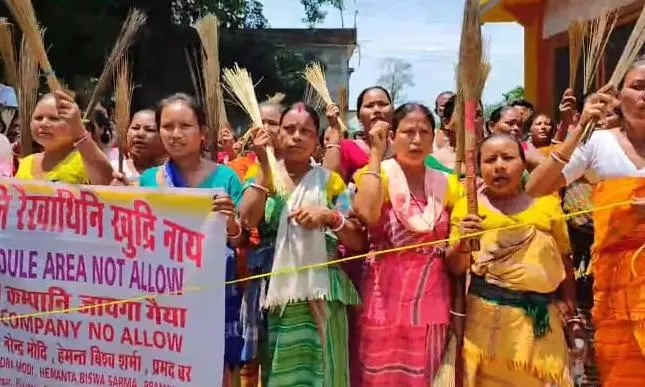
Massive protest erupts in Assam's Bodoland over Adani's thermal power project in Kokrajhar
The fight is for restoring indigenous land rights of Bodo tribals; thermal plant is set up in area partly earmarked as forest area, vital for ecology, livelihood

Massive protests have erupted in six Bodo-inhabited villages, under the Bagribari Revenue Circle of Assam’s Kokrajhar district, after the Assam government and the Bodoland Territorial Council (BTC) allotted 3,600 bighas of land—part of a protected forest area—to the Assam Power Distribution Company Limited (APDCL) for setting up a thermal power plant in partnership with the Adani Group.
The proposed project, situated at Bashbari in Paglijhora PRF (Proposed Reserve Forest), falls within the constitutionally recognised Sixth Schedule tribal area and includes villages like Dukisukijhar Part II & III, Paglijhora Part I & II, and Mowamarijhar under Rupshi Mouza.
Forest rights bypassed
In April 2025, forest rights over 280 hectares of this land had been formally recognised under the Forest Rights Act (FRA), 2006, and these villages were designated as revenue villages. Despite this, the forest classification legally remains unchanged, therefore mandating clearances under Section 2 of the Forest Conservation Act and environmental approvals, which have reportedly not been obtained.
“This is a blatant violation of both the Forest Rights Act and the Forest Conservation Act,” said Daorao Dekhreb Narzary, advisor of the Bashbari Land Right Protection Committee.
Also read: Mining mafia has field day in Assam forests; officials subdued, whistleblowers silenced
According to him, nearly 80 per cent of the land is occupied and used by indigenous Bodo families for homesteads, agriculture, and cattle rearing. “The area is not unclassified but is Bhiti and Sali class land, as per Chitta records. Moreover, 20 per cent is a conserved forest with standing sal trees—vital for both ecology and the local livelihood,” he added.
Suspicious approval process
A major point of contention is the questionable timeline of the Sub Divisional Land Advisory Committee (SDLAC) approval.
The SDLAC supposedly approved the land allotment to APDCL on April 9, 2025—well before the Assam Cabinet even took a formal decision on May 4. Local tribal leaders and rights activists allege the SDLAC meeting was manipulated under political pressure to facilitate the project.
“Allotment without proper legal process and bypassing the Sixth Schedule authority is unconstitutional,” said Harishwar Brahma, president of the All Assam Tribal Students’ Union (AATSU).
“The BTC is governed by the Sixth Schedule. The Assam Cabinet has no jurisdiction to allot land within this autonomous region,” Brahma said.
Official push for energy hub
The state government argues that the project is part of the Assam Thermal Power Generation Product Promotion Policy 2025, aiming to turn Assam into a regional power hub.
The ₹20,000 crore project is designed to generate 1,800 MW, for which the APDCL will hold a 27 per cent equity stake, while the Adani Group will invest the remaining amount.
Also read: Budget-2025 announces new fertiliser plant in Assam, but there's a catch
BTC Chief Pramod Boro justified the move stating, “The project will create thousands of jobs and help Assam achieve energy self-sufficiency as demand is expected to reach 5,000 MW by 2032.”
The local populace only became fully aware of the land allotment after Jeet Adani’s visit to the proposed site in March 2025, soon after the Advantage Assam 2.0 summit. This visit, combined with sudden government survey activity, triggered suspicions and unrest among the villagers.
Protests escalate as eviction looms
Fearing displacement and loss of livelihood, local Bodo residents, including over 150 families who have lived there “since time immemorial,” began resisting administrative activity.
On June 11, a revenue department survey team was forced to retreat amid mounting tension. The next day, a police-escorted team faced more resistance, with Bodo women threatening self-immolation in protest.
“The promise of jobs is a lie. Adani’s thermal plant in Godda, Jharkhand, employs only 315 people. Our entire community’s survival is being traded for false promises,” Narzary added.
Concerns about environmental degradation, agricultural loss, and health hazards—similar to those reported near Adani’s Godda thermal plant—are also fuelling the protests.
Opposition slams move
Leader of the Opposition in the Assam Assembly, Debabrata Saikia, strongly condemned the move. “The BJP-led government has trampled on the spiritual and constitutional rights of Bodo tribals. People are sleeping on the roads to protect their land. This isn’t development—it’s dispossession.”
As the BTC gears up for elections in September, the timing of the land demarcation and attempts to push through the project are raising serious political and ethical questions.
The demand for immediate rollback of the allotment and restoration of indigenous land rights is growing louder by the day.

